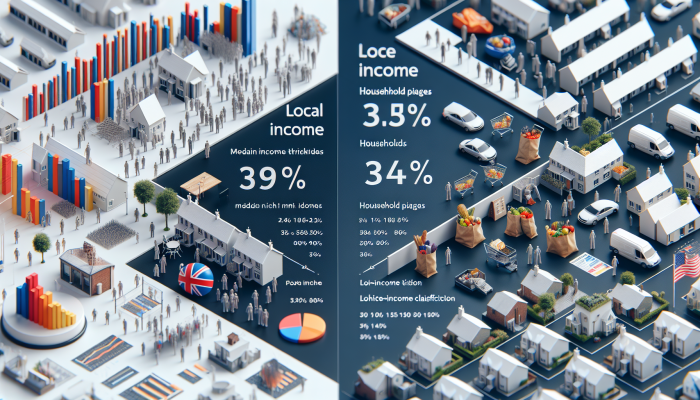Effective Methods for Qualifying for Assistance Programs When You Have a Low Income
Gaining insight into how to qualify with a low income is vital for individuals and families aiming to receive support from various assistance programs specifically designed for those undergoing financial difficulties. The term low income can differ significantly based on geographic area, the size of the household, and the current local economic climate. Typically, governmental bodies—federal, state, or local—establish specific low-income thresholds, which directly influence eligibility for numerous assistance programs intended to offer essential support for those in need. Understanding these thresholds is the first crucial step in assessing your eligibility and accessing the resources available.
Understanding Local Income Thresholds for Assistance Programs

To skillfully navigate the complex landscape of low-income qualifications, it is essential to comprehend the specific income thresholds applicable to your locality. For instance, in the UK, the government defines “low income” as any income falling below 60% of the regional median, thus categorizing those individuals as low-income earners. These figures can vary depending on household dynamics and local economic conditions. Conversely, in the United States, the Department of Housing and Urban Development (HUD) establishes low-income guidelines based on the area’s median income (AMI). Being aware of these thresholds not only aids in evaluating your financial situation but also significantly enhances your ability to access the resources that are available.
Furthermore, it is critical to recognize that income thresholds can differ dramatically from one region to another. For example, living in London may result in a higher threshold compared to more rural areas. Therefore, conducting thorough research on local resources and consulting official government websites for the most accurate and relevant information regarding income thresholds is essential. This diligent research empowers individuals to determine their eligibility for various assistance programs and advocate for their rights with confidence.
Identifying the Essential Eligibility Criteria for Assistance Programs
The requirements for attaining low-income status often encompass a range of factors beyond mere income levels. These criteria may include family size, citizenship status, and other financial considerations. For example, many government assistance programs necessitate that applicants provide proof of their income along with detailed information regarding any assets they might hold, such as bank account balances, property ownership, and various financial investments.
Moreover, certain programs may impose specific requirements related to employment status. For instance, individuals who are unemployed or underemployed may qualify for different forms of assistance compared to those who are employed but still meet the low-income threshold. Additionally, some programs prioritize vulnerable groups, including single parents, seniors, or individuals living with disabilities.
Understanding these eligibility criteria is vital for effectively navigating the assistance landscape. By familiarizing yourself with the requirements, you can prepare your applications with the necessary documentation and information that substantiates your low-income status. This level of preparedness not only enhances your chances of qualifying for the support you need but also streamlines the application process.
Compiling Necessary Documentation to Validate Low-Income Status
When it comes to confirming your low-income status, having the correct documentation is of utmost importance. Assistance programs typically require various documents to verify your income and living conditions. This generally includes recent pay stubs, tax returns, bank statements, and proof of any government assistance you may be receiving.
In addition to income documentation, you may need to provide information about your household composition. This could entail submitting documents that verify the number of individuals living in your home, such as birth certificates for children or proof of residency for other family members.
Keeping your documents organized and easily accessible is essential, particularly since the application process for assistance can often be time-sensitive. By collecting the required paperwork in advance, you can streamline your application process and minimize the risk of delays or rejections. Moreover, being well-prepared signals to the reviewing body that you are serious about obtaining assistance and meet the required criteria.
Your Comprehensive Guide to Government Assistance Programs for Low-Income Families

Gaining a thorough understanding of the various government assistance programs available for low-income individuals and families is essential for those searching for financial support. These programs play a vital role in providing crucial assistance in areas such as housing, food, and healthcare, significantly improving the overall quality of life for beneficiaries.
Exploring Housing Benefits for Low-Income Individuals
Applying for housing assistance is often a critical step for individuals and families experiencing low incomes. In the UK, the housing benefit system is structured to support those on low incomes in effectively managing their rental costs. Understanding the application process and the criteria used to determine eligibility is essential for success.
To qualify for housing benefits, applicants typically need to demonstrate that they are receiving a qualifying benefit or are classified as having a low income. This often requires the submission of income documentation and proof of residency. The amount of assistance you may receive will depend on several factors, including your income, household size, and the current local housing market rates.
Navigating the application process may seem overwhelming, but local councils and housing associations frequently provide resources and support. Many also offer online tools to help estimate potential benefits, simplifying the understanding of your eligibility for assistance. Additionally, engaging in local workshops or clinics can provide valuable insights and address any questions you may have.
Accessing Essential Food Assistance Programs
Food assistance programs, including food stamps and food banks, serve as critical resources for low-income individuals and families. These programs are designed to alleviate food insecurity by granting access to nutritious food. In the UK, various food assistance initiatives, such as the Department for Work and Pensions’ Healthy Start scheme, specifically assist low-income families with young children.
To qualify for food assistance, applicants must provide proof of income and demonstrate their financial need. Numerous local charities and non-profit organizations operate food banks that distribute food parcels to those in need. These food banks often establish their eligibility criteria, which may require a referral from a social worker or healthcare professional; however, they generally aim to assist anyone struggling with food insecurity.
Moreover, community initiatives frequently offer supplementary support, such as cooking classes or nutrition education, empowering individuals to make informed food choices. Engaging with these resources can assist you in managing your food budget more effectively while enhancing your overall well-being.
Examining Healthcare Subsidies for Low-Income Individuals

Accessing affordable healthcare is a fundamental necessity for individuals with low incomes. Various healthcare subsidies and programs are designed to assist low-income individuals in receiving essential medical care. In the UK, the National Health Service (NHS) provides free services at the point of use; however, certain individuals may still incur costs related to prescriptions, dental care, or optical services.
To qualify for healthcare subsidies, you may need to demonstrate your income level. In specific cases, individuals receiving certain benefits might automatically qualify for reduced-cost prescriptions or dental care. Staying informed about the various types of assistance available is vital, as eligibility can vary based on your specific circumstances.
Additionally, non-profit organizations often provide health services at reduced rates or even free of charge. These organizations typically cater to low-income populations and offer everything from general medical care to mental health services. Knowing where to find these resources can significantly enhance your access to essential healthcare.
Unlocking Educational Opportunities for Low-Income Individuals
Education serves as a powerful tool for breaking the cycle of poverty, and numerous opportunities are available for low-income individuals seeking to enhance their educational qualifications and skill sets.
Finding Scholarships and Grants for Low-Income Students
Scholarships and grants specifically designed for low-income students can significantly alleviate the financial burden associated with education. Many colleges and universities offer scholarships based on financial need, merit, or a combination of both. It is crucial to research and apply for these scholarships, as they can cover tuition fees and additional costs such as books and supplies.
In addition to institutional scholarships, various organizations and foundations provide grants for low-income students. These grants typically do not require repayment, making them invaluable for those pursuing higher education. Exploring scholarship databases and dedicated websites is essential to uncover opportunities tailored to your unique circumstances.
Networking with academic advisors or financial aid officers can also reveal lesser-known scholarships and grants that may be available. By actively seeking out these resources, you can maximize your chances of securing the financial support necessary to pursue your educational ambitions.
Taking Advantage of Tuition Assistance Programs
Tuition assistance programs represent another avenue of support for low-income individuals seeking education. Many community colleges and vocational schools offer financial aid based on demonstrated financial need. These programs often include reduced tuition rates, flexible payment plans, or grants that can alleviate the financial burden associated with education.
To qualify for tuition assistance, applicants typically need to complete a Free Application for Federal Student Aid (FAFSA) or its equivalent, depending on the country. This form assesses financial need and determines eligibility for various types of financial aid. Accurately and promptly completing your application is crucial to maximizing your opportunities for assistance.
Additionally, some organizations and employers provide tuition reimbursement programs, which can further help offset educational costs. Investigating all available options and applying early can significantly enhance your ability to access tuition assistance.
Exploring Student Loan Forgiveness Opportunities
Student loan debt can represent a significant burden for many low-income graduates. Fortunately, various loan forgiveness programs exist to assist those who meet specific criteria. In the UK, student loans are often forgiven after a certain period, particularly for individuals earning below a defined income threshold.
In the United States, numerous federal student loan forgiveness programs, including Public Service Loan Forgiveness (PSLF) and Teacher Loan Forgiveness, cater specifically to low-income individuals. These programs often require borrowers to work in qualifying fields or serve in specific capacities for a predetermined duration.
Understanding the requirements for loan forgiveness is critical for effectively managing your education debt. Keeping meticulous records and ensuring that you meet all necessary criteria can pave the way for loan forgiveness, alleviating financial stress and allowing you to focus on your career and personal development.
Employment and Training: Elevating Your Career Opportunities
Securing stable employment is a fundamental aspect of improving one’s financial situation. Various programs and resources exist to assist low-income individuals in acquiring the skills and experience necessary for career advancement.
Exploring Job Training Programs
Many organizations provide free or low-cost job training programs aimed at helping individuals acquire marketable skills. These programs often target high-demand industries, such as healthcare, technology, or skilled trades, equipping participants with the qualifications necessary to secure stable employment.
To qualify for these training programs, applicants may need to demonstrate financial need and provide documentation regarding their current employment status. Many training programs also offer supplementary support services, such as resume workshops and interview preparation, which further enhance employability.
Participating in job training can create pathways to better job opportunities and higher wages, ultimately assisting individuals in lifting themselves out of low-income situations. Furthermore, networking with program coordinators and fellow participants can lead to invaluable connections within your chosen industry.
Embracing Apprenticeships as a Learning Pathway
Apprenticeships present a unique opportunity to earn while you learn, making them an appealing option for low-income individuals. These programs blend on-the-job training with classroom instruction, allowing participants to gain practical experience while receiving a wage.
To secure an apprenticeship, it is essential to research local opportunities and industries that offer such programs. Various trade unions and professional organizations actively promote apprenticeship schemes, which can provide a structured pathway to a successful career.
Moreover, completing an apprenticeship often leads to permanent employment. By leveraging these opportunities, low-income individuals can build sustainable careers while avoiding the student debt commonly associated with traditional educational pathways.
Utilizing Employment Support Services
A multitude of support services are available for low-income job seekers, ranging from job placement assistance to career counseling. Numerous non-profit organizations and government agencies provide resources to help individuals secure stable employment.
These services often include resume writing workshops, interview coaching, and job search assistance, equipping job seekers with the necessary tools to successfully navigate the competitive job market. Additionally, certain programs may offer follow-up services to ensure ongoing support after securing employment.
Utilizing these resources can significantly enhance your chances of finding suitable employment while providing the encouragement and support needed to overcome the challenges associated with low-income job searching.
Implementing Financial Management Strategies for Low-Income Households
Effective financial management is essential for low-income households to maximize their limited resources. By implementing sound financial practices, individuals and families can enhance their financial stability and work towards achieving long-term goals.
Developing Practical Budgeting Techniques for Low-Income Individuals
Establishing a budget is crucial for low-income individuals striving to manage their finances effectively. A well-structured budget enables you to track your income and expenses, identify areas for cost savings, and allocate funds towards necessary needs.
Start by listing all sources of income, followed by a detailed account of monthly expenses, which may include rent, utilities, groceries, and transportation. Once you have a comprehensive overview of your financial situation, you can prioritize necessary expenses and identify discretionary spending that can be minimized or eliminated.
Utilizing budgeting apps or tools can simplify the process, making it easier to manage your finances. Regularly reviewing and adjusting your budget can help you maintain accountability and adapt to any changes in your financial circumstances.
Implementing Effective Debt Reduction Strategies
Managing debt can be particularly challenging for low-income individuals, but various strategies can help alleviate this burden. First, prioritize your debts based on interest rates and payment deadlines. Focus on paying off high-interest debts first, as these can accumulate quickly and hinder your ability to manage other expenses.
Additionally, consider contacting creditors to discuss payment plans or potential settlements. Many lenders are willing to work with individuals facing financial difficulties, and negotiating lower payments can ease the strain on your budget.
Exploring options for consolidating debts or seeking assistance from credit counseling services can also prove beneficial. These resources can provide valuable advice on effective debt management and help you develop a sustainable plan to achieve financial stability.
Adopting Practical Saving Techniques for Low-Income Households
Saving money on a low income might seem overwhelming, but it is achievable with the right strategies. Start by setting realistic savings goals, even if they are modest. Establishing a separate savings account can help you resist the temptation to dip into your savings for daily expenses.
Consider employing the “pay yourself first” approach by allocating a portion of your income to savings before addressing other expenses. This method can help cultivate a savings habit, gradually increasing your financial cushion for emergencies or future investments.
Furthermore, explore community resources that may offer matching savings programs or incentives for low-income individuals. These initiatives can significantly enhance your savings efforts and support your journey toward a more secure financial future.
Leveraging Community Resources for Low-Income Support
Community resources play a vital role in assisting low-income individuals and families, providing various services and support to help them navigate financial challenges.
The Critical Role of Food Banks and Pantries
Food banks and pantries serve as essential lifelines for individuals and families facing food insecurity. These community resources provide free groceries and meals to those in need, helping alleviate hunger and ensuring families have access to nutritious food.
To access food bank services, individuals typically need to present proof of income, residency, and any required identification. Many food banks operate on a no-questions-asked basis, ensuring that assistance is available to anyone in need.
Beyond food distribution, some food banks offer supplementary services, such as nutrition education, cooking classes, and meal planning workshops. Engaging with these resources empowers individuals to make healthier food choices and maximize their grocery budgets.
Support from Charitable and Non-Profit Organizations
A multitude of charitable and non-profit organizations are dedicated to supporting low-income individuals and families. These organizations offer a range of services, including financial assistance, job training, and educational resources.
To access these resources, it is essential to conduct thorough research on local charities and non-profits in your area. Many organizations have specific programs tailored to assist low-income populations, and their services can greatly ease financial burdens.
Volunteering with these organizations can also create valuable networking opportunities and provide a chance to give back to the community. Building connections within these networks may lead to additional support and resources to aid you on your journey toward financial stability.
Community Centers as Essential Hubs for Local Support Services
Community centers often serve as vital hubs for local support services, offering a variety of resources and programs for low-income families. These centers may provide access to food assistance, childcare services, healthcare resources, and educational workshops, all aimed at improving the well-being of community members.
Community centers frequently host events and activities designed to foster social connections and community engagement. Participating in these events can provide a sense of belonging and support, which is particularly beneficial for individuals facing financial hardships.
Exploring the services offered by your local community center can reveal valuable resources that may assist you in navigating your low-income situation more effectively.
Empowering Yourself: Understanding Your Rights Through Legal Aid
Being aware of your legal rights is essential for low-income individuals, as it empowers you to advocate for yourself and access necessary support.
Securing Free Legal Services
Free legal services are available to assist low-income individuals with a variety of legal issues, including housing disputes, family law matters, and consumer protection. Many organizations offer pro bono services, providing legal representation and guidance to those unable to afford a lawyer.
To access these services, individuals must demonstrate financial need and submit relevant documentation. Researching local legal aid organizations can help you find the support you require.
Numerous community centers and non-profit organizations also provide legal clinics or workshops, offering valuable information on navigating common legal challenges. Engaging with these resources can empower you to understand your rights and seek assistance in resolving legal issues effectively.
Understanding Tenant Rights for Low-Income Renters
Understanding tenant rights is crucial for low-income individuals renting their homes. Tenants possess specific rights concerning housing conditions, eviction processes, and rent increases. Familiarity with these rights enables you to advocate for yourself and ensure that your landlord complies with their legal obligations.
If you encounter issues with your landlord or housing conditions, seeking assistance from local tenant advocacy organizations can be invaluable. These organizations frequently offer resources, guidance, and legal representation to help tenants navigate disputes effectively.
Being informed about your rights as a tenant not only protects you but can also enhance your overall housing stability, making it easier to focus on other essential aspects of your life.
Consumer Protection for Low-Income Individuals
Low-income individuals can often be vulnerable to financial exploitation, making it imperative to comprehend consumer protection laws. These laws are designed to safeguard consumers from unfair or deceptive practices and ensure fair treatment in financial transactions.
If you believe you have fallen victim to fraud or unfair practices, various resources are available to help you report these issues and seek resolution. Numerous consumer protection agencies provide information about your rights and can assist you in navigating disputes with businesses.
Staying informed about your consumer rights empowers you to make informed financial decisions and protect yourself from potential exploitation.
Mastering the Low-Income Assistance Application Process
Navigating the application process for assistance can be daunting, but understanding the necessary steps can significantly improve your chances of success.
Completing Application Forms with Accuracy
Filling out application forms accurately and efficiently is crucial when applying for assistance. Most forms require personal information, income details, and documentation to support your claims. Taking the time to thoroughly read the instructions and ensuring that you provide all the required information can prevent processing delays for your application.
Consider seeking help from local organizations or community centers that offer application workshops or one-on-one support. These resources can provide valuable guidance on completing forms correctly and help you avoid common mistakes.
Keeping copies of all submitted documents can also assist you in tracking your application and facilitate effective follow-up.
Avoiding Common Mistakes During the Application Process
When applying for assistance, it is crucial to be aware of common mistakes that can lead to rejections. One of the most frequent errors is failing to provide complete or accurate information. Always double-check all entries and ensure you provide any requested documentation.
Another prevalent issue is missing deadlines. Many assistance programs operate on strict timelines, and late applications may not be considered. Mark important deadlines on your calendar to help you stay organized and ensure your application is submitted on time.
Seeking feedback from others or utilizing local resources for application support can also help identify potential pitfalls before you submit your forms.
The Importance of Follow-Up and Appeals
After submitting your application, it is vital to follow up to ensure it is being processed. Many agencies provide tracking systems or contact information for inquiries, allowing you to check the status of your application.
If your application is denied, do not be discouraged. Most assistance programs include an appeals process that allows you to contest the decision. Understanding the appeals process and gathering the necessary documentation to support your case can improve your chances of a successful appeal.
Being proactive in following up on your application and comprehending your options empowers you to navigate the assistance landscape effectively and secure the support you need.
Inspiring Success Stories: Overcoming Challenges Associated with Low Income
Real-life success stories of individuals who have successfully qualified for assistance can provide motivation and practical insights for those facing similar challenges.
Case Studies Highlighting Successful Assistance Qualifications
Numerous case studies illustrate the journeys of individuals who have navigated the challenges of qualifying for assistance while on a low income. For example, one single mother successfully accessed housing benefits, enabling her to secure stable accommodation for herself and her children. Through diligent budgeting and engaging with local resources, she also managed to reduce her debt and enhance her overall financial situation.
Another case study features a young graduate who utilized job training programs to enhance her skills and secure stable employment. By leveraging community resources and networking, she successfully transitioned from low-income status to a fulfilling career.
These narratives serve as essential reminders that, although the path may be challenging, overcoming obstacles and achieving financial stability is indeed possible.
Key Takeaways from Success Stories
The lessons gleaned from these success stories reveal essential strategies and practices that others in similar situations can adopt. One significant takeaway is the importance of seeking support from local resources, such as community centers, non-profit organizations, or government agencies.
Networking and building connections within your community can open doors to new opportunities and provide invaluable guidance throughout your journey. Moreover, maintaining a positive mindset and proactively seeking assistance can significantly improve your financial situation.
These stories illustrate that resilience, resourcefulness, and determination can lead to successful outcomes, even amid adversity.
Practical Tips for Seeking Assistance
Several actionable tips based on real-life success stories can empower individuals seeking assistance. First, take the initiative to research local resources and programs tailored to low-income individuals. Knowing what is available can significantly enhance your ability to access assistance effectively.
Second, develop a comprehensive plan for managing your finances, including budgeting and tracking your expenses. This will help you gain a better understanding of your financial situation while preparing for future challenges.
Finally, do not hesitate to reach out for support. Leveraging available resources, such as connecting with mentors, attending workshops, or accessing legal aid, can provide the guidance and encouragement necessary to navigate your journey successfully.
Future Outlook: Anticipating Changes in Low-Income Support Systems
Staying informed about future trends in low-income support can help individuals and families effectively navigate their financial challenges and access available resources.
Awareness of Policy Changes Shaping Low-Income Support
Policy changes can significantly impact low-income support programs. It is essential to remain informed about upcoming legislative changes that may affect eligibility criteria, funding levels, or program availability. Engaging with advocacy organizations or community groups can provide valuable insights into potential changes and how they may affect you.
Moreover, participating in community forums or town hall meetings offers opportunities to voice your concerns and influence policy discussions related to low-income support.
Technological Innovations Enhancing Access to Assistance
Technological advancements are transforming how individuals access assistance and resources. Many organizations are now utilizing technology to streamline the application process, making it more convenient for low-income individuals to apply for support online. This can eliminate barriers associated with traditional paper applications, thereby increasing accessibility.
Additionally, mobile apps and online platforms are emerging to provide real-time information on available resources, assisting individuals in identifying nearby assistance programs. Staying informed about these technological innovations can enhance your ability to access support when needed.
Community Initiatives Supporting Holistic Low-Income Assistance
New community initiatives aimed at supporting low-income families are continually being developed. These initiatives often focus on collaboration between local organizations, businesses, and government agencies to provide comprehensive support services.
For instance, community-led efforts may include job fairs, financial literacy workshops, or family support programs designed to enhance well-being. Engaging with these initiatives can provide valuable resources and foster connections within your community.
By remaining informed about future trends and actively participating in community initiatives, low-income individuals can more effectively navigate their challenges and work towards building a more stable and prosperous future.
Frequently Asked Questions Regarding Low-Income Support
What is defined as low income?
Low income generally refers to earnings below a specific threshold compared to the median income in a given region. This threshold can vary based on household size and local economic conditions.
What is the process for applying for housing benefits?
To apply for housing benefits, complete an application form, provide proof of income and residency, and submit any required documentation to your local council or housing authority.
What food assistance programs can I access?
Food assistance programs include food banks, food stamps, and local charities that provide grocery support. Eligibility for these programs often requires proof of income and residency.
How can I find scholarships available to low-income students?
Researching scholarship databases, contacting academic advisors, and exploring local foundations can help you identify scholarships specifically designed for low-income students.
What job training resources can assist those with low incomes?
Many community organizations, non-profits, and government agencies offer free or low-cost job training programs to help low-income individuals acquire marketable skills.
What budgeting tools can I use for effective financial management?
Various budgeting apps and tools are available to assist individuals in tracking income and expenses, setting savings goals, and managing their finances more effectively.
How can I access free legal services?
Free legal services can be accessed through local legal aid organizations, law clinics, and community centers that provide pro bono assistance for low-income individuals.
What rights do I possess as a tenant?
As a tenant, you have rights concerning housing conditions, eviction processes, and rent stability. Familiarizing yourself with these rights can help you advocate for yourself in disputes with landlords.
How can I effectively reduce my debt while on a low income?
To reduce debt, prioritize high-interest debts, negotiate payment plans with creditors, and consider seeking advice from credit counseling services for effective debt management strategies.
What community resources can assist low-income families?
Community resources may include food banks, charity organizations, community centers, and local support services that assist with housing, food, and healthcare.
Connect with us on Facebook!
This Article Was First Found On: https://www.debtconsolidationloans.co.uk
The Article Low Income Qualifying: Essential Strategies for Success Was Found On https://limitsofstrategy.com

